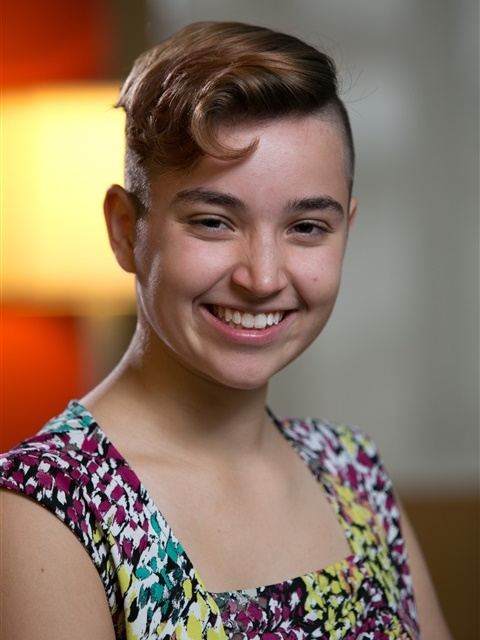
Anna Voelker, one winner of Ohio State’s President’s Prize, developed the “AstroAccess” project focused on making science more accessible for people with disabilities. Credit: Courtesy of OSU
For fourth-year Anna Voelker, winning the President’s Prize is much more than receiving a cash award; it’s an opportunity to make a change she wishes to see in the world by increasing access to careers in astronomy and physics for people with disabilities and specialized needs.
Voelker will work to provide more access through her development of AstroAccess, an astronomy-based scientific-outreach initiative focusing on students with disabilities and specialized needs.
Helping others participate in scientific exploits has long been a passion for Voelker, who designed her own major through the College of Arts and Science’s Personalized Study Program, and currently works on an education project for NASA at the Kennedy Space Center in Florida.
The initiative has three main components to it. The first starts out with a two-month trip to visit the South African Astronomical Observatory in Cape Town, South Africa.
While in South Africa, Voelker will work with the International Astronomical Union — which works to promote and safeguard astronomy through its international research and education — to enhance outreach efforts and improve the networking organizations for individuals with disabilities.
The IAU has created a directory of astronomical organizations that Voelker thinks is essential to her vision.
“One of the problems is that not all of these projects are collective,” she said. “We need to make it known in our own communities and that requires different types of networking.”
Voelker’s goal is to develop and expand the directory so that it is able to additionally benefit people with disabilities.
The second component of her initiative will be the one to which most of the award money will be applied. Voelker plans to work with Scott Lissner, coordinator of the Americans with Disabilities Act at Ohio State, to help educators implement new methods for teaching students with disabilities.
Those will include holding a conference in which researchers, scientists and students with disabilities will attend and present.
Voelker said the conference will take place in April 2019 and be followed shortly after by the third and final step in Voelker’s Initiative — a trip to London where she intends to work with the Shakespeare and Autism Outreach program.
AstroAccess will include methods and games created by Kelly Hunter, a veteran of the Royal Shakespeare Company who created the Hunter Heartbeat Method, which includes sensory games that aid children with autism in learning how to gauge facial expressions, eye contact and body language, and apply it to learning scientific information.
Voelker also intends to use some of her award money to pay for staffing so students on the autism spectrum will have a 1:1 ratio when taking her 12-week outreach program.
The students involved with her initiative will do many of the exercises and games learned at the Shakespeare and Autism Outreach program, but Voelker plans to give her program an astronomical theme in which students with disabilities will be able to pioneer worlds of information they’ve never had the opportunity exploring before.
“It’s about trying to make a specific difference in your community, and once you can do it there, then you make that same difference in a global community.” Voelker said.
The Engaged Scholars logo accompanies stories that feature and examine research and teaching partnerships formed between The Ohio State University and the community (local, state, national and global) for the mutually beneficial exchange of knowledge and resources. These stories spring from a partnership with OSU’s Office of Outreach and Engagement. The Lantern retains sole editorial control over the selection, writing and editing of these stories.



